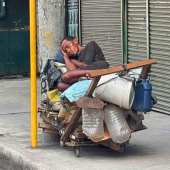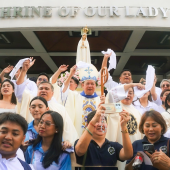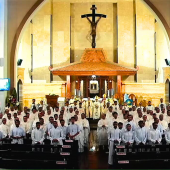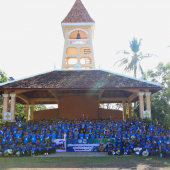Filipino Bishop Decries Government Ghost Projects: ‘Stop the Fake and Sloppy Infrastructure!’

In recent months, the phrase “ghost projects” has dominated public discourse in the Philippines. Following a series of government exposés, numerous flood control projects have come under scrutiny. Despite billions of pesos in allocated funding, many of these infrastructures were either left unfinished or never built at all.
Allegations suggest that funds were siphoned off by politicians and contractors. In a country battered by multiple typhoons each year, such revelations have sparked widespread public outrage.
In a privilege speech on August 20, Senator Panfilo Lacson revealed that Bulacan, one of the most flood-prone provinces in Central Luzon, had received P43.5 billion worth of flood control contracts from the Department of Public Works and Highways (DPWH). Senate hearings and inspections later confirmed that many of these were “ghost projects”, reported as complete but either substandard or nonexistent.
Justice Secretary Crispin Remulla disclosed that at least three ghost projects in Bulacan, worth nearly P300 million, are now under investigation. A special task force has been created to probe what he described as systemic corruption.
Amid these developments, Bishop Dennis Villarojo of the Diocese of Malolos, which covers Bulacan, issued a pastoral statement on September 17 calling for swift justice. “To the lawmakers, prosecutors, and the judiciary: convict and solve the cases of corruption in a speedy manner, with integrity and without bias,” he urged.
The bishop emphasized that the government inquiries should not only punish wrongdoers but also pave the way for stronger laws that uphold accountability. He reminded politicians that public office is a vocation, not a business. “We urge them to be open to the investigation into the ghost flood control projects,” he said.
Bishop Villarojo also appealed to the faithful to reject corruption and resist normalizing it: “Be mindful of false promises and actively participate in building a culture of truth and accountability… Be responsible in using social media and other forms of technology to scrutinize and reveal the truth.”
Addressing his priests, he reminded them of their mission to guide the faithful in embracing truth and rejecting evil. He called on parishes to hold Holy Hours, offer special Mass intentions, and conduct catechesis on healing the wounds of corruption.
“We have to come together, the clergy and the laity, not only in building the broken or impeded infrastructure projects, but also in regaining public trust. Holding on to faith, we will emerge from the floods of corruption,” he said.
Mass demonstrations on the ghost projects issue are set to culminate on September 21 with the “Trillion Peso March,” organized by Church leaders, student groups, and civic organizations. Around 30,000 people are expected to join.
Radio Veritas Asia (RVA), a media platform of the Catholic Church, aims to share Christ. RVA started in 1969 as a continental Catholic radio station to serve Asian countries in their respective local language, thus earning the tag “the Voice of Asian Christianity.” Responding to the emerging context, RVA embraced media platforms to connect with the global Asian audience via its 21 language websites and various social media platforms.













